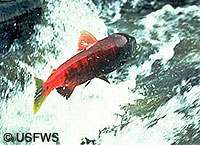
| Re-Thinking Meat and Seafood Choices | 18 March 08 |
 As world production and consumption of meat and seafood continue to grow, society is taking a closer look at the environmental and health impacts of what we eat, according to the World Watch Institute. As world production and consumption of meat and seafood continue to grow, society is taking a closer look at the environmental and health impacts of what we eat, according to the World Watch Institute.In 2006 farmers produced four times as much meat as in 1961. The fishing industry harvested eight times as much as in 1950. Huge confined animal feeding operations consume enormous amounts of energy, pollute water supplies, generate significant greenhouse gases and require ever-increasing amounts of corn, soy and other grains; a dependency that creates pressure to clear forested land. Dumping polluted wastewater into our oceans is creating problems for human heath, resulting in tuna, farmed salmon, swordfish, marlin and oysters (among others) being found to contain contaminants like mercury, cadmium and PCBs. Re-thinking how fish and meat are produced will mean higher prices, and consumers in industrial countries will eat less of these products. Eating less fish and meat now is an investment in the future; saving family farm;, improving rangeland; reducing water pollution; and preserving increasingly scarce fish stocks. View Worldwatch Institute's 2008 State of the World chapter 5: Meat and Seafood: The Global Diet's Most Costly Ingredients (PDF) View January 27, 2008 New York Times article View February 16, 2008 New York Times article View Greenpeace USA information on over fishing View David Suzuki Foundation pages on sustainable seafood issues and choices View February 29, 2008 The Student Life article Sources: Worldwatch Institute, Greenpeace USA, David Suzuki Foundation, New York Times |
|
 Print version Print version |
Top |
